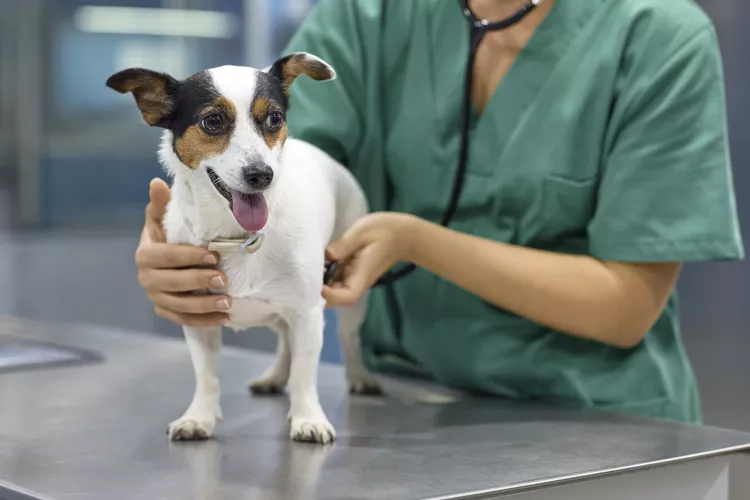
Does your dog make a whistling noise when they breathe? Is the whistling new or has it been happening off and on for a while? Whistling while breathing is a sign that your dog is wheezing. Dogs can wheeze for a multitude of reasons, some of them benign and some of them more serious.
A dog will wheeze when they breathe because something in the trachea (windpipe) or further down the airway is blocking the flow of air. Sometimes, reverse sneezing is mistaken for wheezing, so watch your dog closely to figure out which it is. There are several possible reasons for wheezing in dogs:
Heartworms are parasitic worms that are transmitted by mosquitoes. Almost every mammal is susceptible to them, including dogs and cats. Wheezing, while it can be a symptom of heartworm disease, is usually only seen in severe cases. A dog that is wheezing because of heartworm disease will have such a large burden of worms in the heart and blood vessels that they are literally blocking your dog's airway. Heartworm disease is easily diagnosed with a blood test. Additional tests, such as chest X-rays, may be needed to determine how severe your dog's heartworm disease is before starting treatment.
Pollens, mold spores, dust mites, and other airborne allergens can be a nuisance to your dog. They can cause irritation to your dog's airway and this irritation can cause wheezing. Airborne allergies usually occur seasonally, but a dog with asthma may be sensitive all year long. Dust mites and household allergens tend to be worse in the winter months when your furnace kicks in. Pollens and mold spores tend to be worse in the spring and summer months when things are in bloom.
A dog with tracheal collapse will have a trachea that narrows to an impossibly small diameter. This can create a distinctive wheezing, honking noise. Breeds that are susceptible to tracheal collapse are usually smaller breeds, such as Yorkshire terriers, shih-tzus, and malteses, but any dog can have a collapsing trachea. If your vet suspects that your dog's wheezing is due to a collapsing trachea, they'll take chest X-rays to visualize the trachea. Your vet will be able to visualize the narrowing of a collapsed trachea on the images.
CHF, or congestive heart failure, is another illness commonly seen in smaller breed dogs, although some larger breeds are also susceptible to it. Although coughing and labored breathing are more common symptoms of CHF, it can also cause wheezing in dogs. CHF is commonly seen in chihuahuas, miniature poodles, Cavalier King Charles Spaniels, and Doberman Pinschers. Congestive heart failure is diagnosed with chest x-rays, blood work, and blood pressure checks. A dog with CHF will have an enlarged heart on X-rays, high blood pressure, and changes in their blood work.
If your dog likes to chew on things, they may get a little too excited with their chewing and swallow down the wrong pipe. They can also inhale small objects while sniffing. Bones, toys, sticks, or grass awns may accidentally get stuck in your dog's airway and this can definitely cause a blockage and wheezing.
A foreign body in your dog's airway is typically diagnosed by chest X-rays and a sedated airway exam (usually dogs need to be sedated in order to physically examine their airway). Some dogs may need a bronchoscopy or a small camera guided down the airways to visualize what is happening. A good clinical history is also helpful in diagnosing a foreign body in your dog's airway, meaning you noticed your dog chewing on something and then they started wheezing.
Wheezing should always be discussed with your pet's veterinarian if noticed. If your dog wheezes for a few seconds and then recovers, it is usually a non-emergency situation, although you should still schedule an appointment with your vet to have the wheezing checked out. However, contact your vet immediately if the wheezing continues, or if you notice any of the following:
If your dog is struggling to breathe, seems uncomfortable, has blue or gray gums, or loses consciousness, immediately go to the nearest open veterinary facility.
Treating your dog's wheezing is entirely dependent on what is causing your dog's wheezing.
Heartworm disease can be treated, depending on the severity. Dogs are typically treated with three rounds of injections to kill the worms followed by strict rest. In severe cases, dogs may need surgery to physically remove the worms.
Allergies and asthma can be treated with medications to control symptoms.
Congestive heart failure is life-threatening and though it depends on the severity, many can still be treated with medications and sometimes diet changes.
Tracheal collapse is often controlled with cough medications as well as with adjustments to your dog's environment and exercise regimen. In more severe cases, surgery can be performed to place a stent in your dog's trachea to better open it.
Foreign bodies in the airway can sometimes be removed during a sedated airway exam. However, a bronchoscopy or surgery may be required.
Congestive heart failure, tracheal collapse, and allergies, for the most part, cannot be prevented. They are something that your dog may or may not be predisposed to or born with. However, foreign bodies and heartworm disease can be easily prevented.
Environment control and proper enrichment can help prevent your dog from accidentally getting something lodged in their airway. Heartworm prevention is common, and there are countless preventatives on the market. Most treatments are oral chews taken monthly, but there are also topicals and injectables available. Your vet can help you determine what prevention is right for your dog.
Wheezing in dogs, even if not immediately urgent, is something that you should have checked out by your vet. Your vet can help determine what is causing your dog's wheezing and how best to treat it.

10 Obscure, Little-known Canine Facts in Honor of National Dog Day
With National Dog Day upon us, it's time to celebrate everything about our favorite pets—even the weirder stuff. Here are 10 obscure facts about dogs you probably didn't know.
Exploring the Different Types of Pet-Friendly Beaches
Are you looking for pet-friendly beaches? Learn about the different types of pet-friendly beaches, their locations, and tips for visiting them with your pet.
Toxic Chemicals & Household Items That Can Poison Dogs
There are many things in and around your home that can endanger your dog. Learn which chemicals and household items can poisin your dog.
Bronchitis in Dogs
Is your dog coughing and feeling unwell? It could be due to respiratory inflammation called bronchitis. Learn the causes, treatment, and prevention.
Choking in Dogs
A dog can occasionally swallow something incorrectly and start choking. Find out how you can tell if your dog is choking and what you can do about it.
Why Does My Dog Smell So Bad?
Does your dog smell? Find out what could be causing these unpleasant odors and if it's something that needs more than just a bath to fix.
Is Rosemary Safe for Dogs?
Rosemary is used both for cooking and as a supplement with many reported health benefits in people, so you may be wondering if it is safe to give to your dog. Rosemary is considered non-toxic for dogs but with some caveats.
Can Dogs Eat Blueberries?
Dogs can safely eat blueberries. Blueberries are packed with nutrients and can be a great addition to your dog's diet when fed in moderation. Learn more about the benefits, risks, how to incorporate blueberries into their diet, and other fruits dogs can eat.
Dog Food Basics
Are you feeding your dog the best way possible? Check out these dog feeding tips to keep your dog healthy and happy.
Swedish Vallhund: Dog Breed Characteristics & Care
The Swedish vallhund makes for a high-energy and affectionate companion. Learn about the breed's history, health, exercise needs, and more.
Becoming a Show Dog: Getting Started
Do you have the perfect puppy? Have you considered showing her in a dog show? There's much more to showing than showing up! Here's how to get started.
How to Care for a Hairless Cat
Hairless cats make great pets but they aren't without their own challenges and requirements. Read on to learn how to best care for your furless feline.
British Shorthair: Breed Profile, Characteristics & Care
The British Shorthair is a calm, affectionate cat that looks and feels like a plush teddy bear. Here's what you need to know about this popular breed, including appearance, temperament, health, and care.
Tonkinese: Cat Breed Profile, Characteristics & Care
The Tonkinese cat is a perfect mix of the Siamese and Burmese—smart, sociable, and sweet. Learn about the Tonkinese breed.
How to Stop Your Cat From Chewing Electrical Cords
Cats are known to pounce and attack inanimate objects, like electrical cords. Learn how to prevent your cat from ambushing objects that may harm it.
How to Stop Aggression in Kittens
Kittens may show aggressive behavior for several reasons. Sometimes their play gets too aggressive while other times the kitten is afraid or upset. Learn how to spot and curb aggression in kittens.
46 Egyptian Cat Names
Whether inspired by notable Egyptian deities, locales, or pharaohs, Egyptian cat names can bring out the divinity of your noble feline companion.
How to Tell If a Kitten is a Boy or a Girl
If you're wondering whether your new kitten is a boy or a girl, here are three ways to help determine the sex of your cat.
Signs Your Cat Is Aging and When to See the Vet
Expect some changes when your cat ages. Learn to differentiate between normal and potential medical problems for your elderly cat.
Coronavirus in Cats
Feline coronavirus (FCoV) rarely harms cats but can lead to another life-threatening illness. Learn the causes, treatment, and prevention.